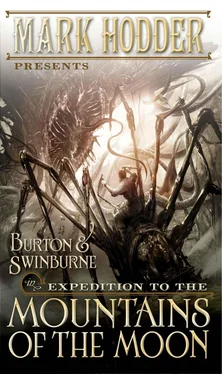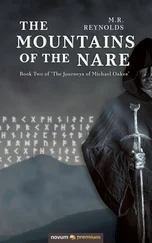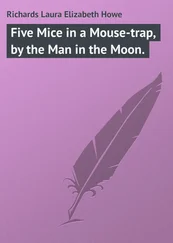Mark Hodder - Expedition to the Mountains of the Moon
Здесь есть возможность читать онлайн «Mark Hodder - Expedition to the Mountains of the Moon» весь текст электронной книги совершенно бесплатно (целиком полную версию без сокращений). В некоторых случаях можно слушать аудио, скачать через торрент в формате fb2 и присутствует краткое содержание. Жанр: sf_stimpank, на английском языке. Описание произведения, (предисловие) а так же отзывы посетителей доступны на портале библиотеки ЛибКат.
- Название:Expedition to the Mountains of the Moon
- Автор:
- Жанр:
- Год:неизвестен
- ISBN:нет данных
- Рейтинг книги:5 / 5. Голосов: 1
-
Избранное:Добавить в избранное
- Отзывы:
-
Ваша оценка:
- 100
- 1
- 2
- 3
- 4
- 5
Expedition to the Mountains of the Moon: краткое содержание, описание и аннотация
Предлагаем к чтению аннотацию, описание, краткое содержание или предисловие (зависит от того, что написал сам автор книги «Expedition to the Mountains of the Moon»). Если вы не нашли необходимую информацию о книге — напишите в комментариях, мы постараемся отыскать её.
Expedition to the Mountains of the Moon — читать онлайн бесплатно полную книгу (весь текст) целиком
Ниже представлен текст книги, разбитый по страницам. Система сохранения места последней прочитанной страницы, позволяет с удобством читать онлайн бесплатно книгу «Expedition to the Mountains of the Moon», без необходимости каждый раз заново искать на чём Вы остановились. Поставьте закладку, и сможете в любой момент перейти на страницу, на которой закончили чтение.
Интервал:
Закладка:
Looking back, Burton saw the Schutztruppen approaching. One of the Germans was very near. He was dressed in a slate-grey uniform and his helmet was spiked at its crown. He held in his hands, like a rifle, a long seedpod with a vicious thorn dripping venom at its end.
The Schutztruppen weren't human.
Burton pushed himself backward through the mud, kicking his feet, trying to get away. He couldn't take his eyes off the approaching soldier. Though a man in shape, the German's head was deformed-his jaws were pushed forward into a snout, and his slavering mouth was filled with long canines. He was a tawny-yellow colour, and black-spotted, and his golden eyes had vertical irises.
The name Laurence Oliphant jumped into Burton's mind, and in a flash he recalled a duel, a clashing of swords, with a man half human and half white panther. The memory was hallucinogenic in its power. He reached for his sword, looked into the thing's feline eyes, and whispered: “Good lord! What have you done to yourself?”
When his hand came whipping up there was not a sword in it, but a pistol, and without even thinking, he pumped four bullets into the German.
He watched as the trooper staggered, dropped the seedpod, and teetered to one side. The creature-a leopard given human shape-flopped to the ground. There were more approaching. Some of them were similarly formed from lithe jungle cats; others were bulky rhinoceros men, or vicious hyena things. Hardly any were fully human.
Fingers closed over Burton's arm. He jerked free of them and scrabbled away before realising they belonged to Bertie Wells. The war correspondent was on his feet. His mouth was working, and faintly, as if from a long way off, Burton heard: “Come on, man! We have to get out of here!”
A chunk of dirt was thrown up near his head. Something tugged violently at his wet sleeve and scored the skin beneath. It finally registered that he was being shot at.
He pushed himself to his feet and, with Wells, started to run as hard as he could.
They passed between two Scorpion Tanks whose tail cannon were spewing fire at the oncoming enemy troops. A pea smashed square into one and the war machine flew apart, sending shards of splintered carapace skittering past the two men.
Burton's hearing returned with a clap, and the dissonances of battle assaulted his already overwhelmed senses.
He and Wells veered to the right, ducked behind the swollen carcass of a long-dead mega-dray horse, and bolted through a field of broken wagons and wrecked wooden shacks.
They ran and ran and eventually reached the base of the Dut'humi Hills.
Seven British hornets, flying extremely low, came buzzing from behind the higher ground. They swept down, passed over the two men, and raked the battlefield with bullets. One of the giant insects was struck mid-thorax by an enemy cannon. It hit the earth and tumbled, enveloped in flames.
At the edge of the undergrowth, Burton noticed a bright poppy-a red beacon amid the foliage.
“This way!” he shouted, and pulled Wells toward it. They threw themselves past the little flower and into thick purplish vegetation. Careless of thorns, they heaved themselves through bushes, climbed over twisted roots, ducked under looped lianas, and forced their way uphill until the frightful noise of conflict began to fade behind them.
Vegetation snagged at and tore their uniforms. Wet leaves dripped on them, though they were already soaked to the skin. Still they kept going, passing over the brow of a jungly hill and down into a stinking swamp. They waded through it, thigh-deep, careless of crocodiles, and emerged onto firmer land where the terrain once again sloped upward. The vegetation was slightly less dense here, and they slowed to walking pace as they passed between tree boles, with a tightly packed canopy overhead.
Burton noticed another poppy off to his left. He steered his companion in that direction.
“There's a place I must go, Bertie.”
“Where?”
“I wish I knew.”
A prickly and malformed plant to Wells's right twitched spasmodically. Milky liquid spurted from it and hit the sleeve of the war correspondent's greatcoat. The material immediately started to smoulder.
Wells swore, ripped the garment open, and pulled it off, throwing it to the ground. He pushed Burton onward, leaving the plant and the coat behind.
“Bloody Eugenicist creations are starting to sprout up all over the place,” he growled. “And they're all acid-spitting, bloodsucking, needle-shooting, poison-scent-emitting atrocities! Look at those, for instance-” He nodded toward the base of a nearby tree. Burton looked and saw a clump of bulbous white fungi.
“Those are Destroying Angel mushrooms-the species they get the A-Spores from. Not native to Africa until the Eugenicists meddled with them. Now they're everywhere!”
They steered carefully past a nest of pismire ants. They were natural, but nevertheless dangerous. Burton knew from painful experience that their bite was like the jab of a red-hot needle.
For the next hour, the two men forced their way onward. Twice more, Burton saw poppies and altered his direction in order to pass by them. He did not mention this to Wells.
Finally, with gasps of relief, they emerged into a small glade. It was carpeted with the bright-red blossoms, and in its very centre, upon a mound, a profusion of multicoloured flowers were thriving. A single beam of sunlight angled through tree branches and brightly illuminated the vivid reds, yellows, blues, and purples. The air was filled with pollen, which shone like gold dust in the shaft of light. Butterflies danced over the flowers. Everything was glowing with an almost supernatural radiance.
“A patch of beauty, at last!” Wells cried. “My eyes can hardly bear it! And look-your favourite poppy is everywhere!”
The two men threw themselves down beside the mound. For thirty minutes or so, they sat in silence, each dealing in his own way with the atrocities they'd witnessed.
Eventually, Burton spoke: “What is it about you, Bertie, that attracts death from the sky? When I first met you it was the spores. Then it was bees. This time, sycamore seeds. What next? Boulder-sized hailstones? Acidic rain? Explosive bloody bird shit?”
“Whatever else I might have to say about them,” Wells responded, “I can't deny that the Germans are damned creative.”
“Unquestionably. What the hell were those Schutztruppen?”
“The Eugenicists are turning animals into soldiers,” Wells replied. “Because they're running out of Africans.”
Burton groaned. “So the loathsome treatment of this continent now extends even to its flora and fauna? I swear to you, I wish a plague would wipe mankind from the face of this world! How despicable we are!”
The smaller man shrugged. “I don't think a plague is required-we're doing a pretty good job of it ourselves. You know, there was a time in my life when I fancied that we could all work together as equals for the good of the species, when I thought that our true nationality was Mankind. Now I recognise that I vastly overestimated the human race. We disguise imperialism as the spread of higher civilisation, but it's blatantly animalistic in its nature. We are no better than carnivores or carrion eaters. Having beast-men fighting this dreadful war is wholly appropriate.”
He took a canteen from his belt and drank from it.
Burton said, “I remember you saying that Palmerston was responsible.”
“Yes.”
“And now you say the imperialistic drive is an animal impulse. Yet I can think of no one more divorced from nature than Palmerston!”
“Pah!” Wells snorted. He handed the canteen to Burton. “Did it never strike you that in his efforts to conquer the natural in himself, he was merely signposting the trait of his that he felt most vulnerable to? All those Eugenics treatments he paid for, Richard-they were the mark of the Beast!”
Читать дальшеИнтервал:
Закладка:
Похожие книги на «Expedition to the Mountains of the Moon»
Представляем Вашему вниманию похожие книги на «Expedition to the Mountains of the Moon» списком для выбора. Мы отобрали схожую по названию и смыслу литературу в надежде предоставить читателям больше вариантов отыскать новые, интересные, ещё непрочитанные произведения.
Обсуждение, отзывы о книге «Expedition to the Mountains of the Moon» и просто собственные мнения читателей. Оставьте ваши комментарии, напишите, что Вы думаете о произведении, его смысле или главных героях. Укажите что конкретно понравилось, а что нет, и почему Вы так считаете.












